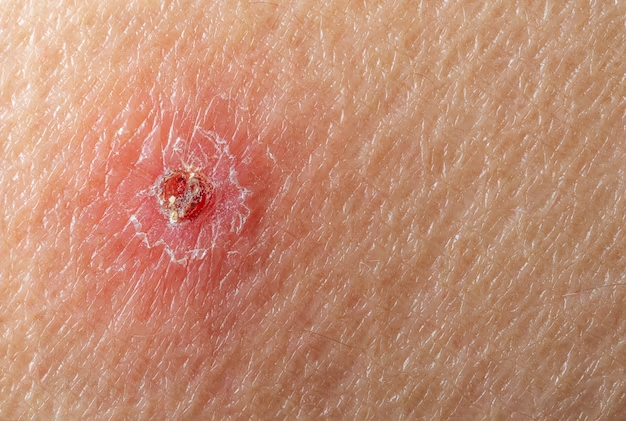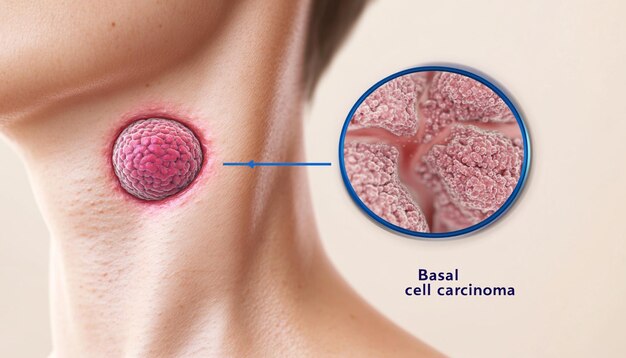The most common form of skin cancer is basal cell carcinoma. It is derived from the basal cells in the outermost layer of the skin. Although BCC is not aggressive, it can be very destructive if left untreated. Knowing what treatment is available is important to a patient and their family. The following discussion will look at some effective treatments for basal cell carcinoma, both traditional and alternative.
Mohs Micrographic Surgery
The most successful form of treatment for basal cell carcinoma is Mohs micrographic surgery. This technique for Mohs micrographic surgery is an elimination procedure, removing the tissue in very thin layers but still having a good view of all the margins at every single step. The excised tissue is examined microscopically for the presence of cancer cells. Thus, Mohs surgery is very effective where the BCC is localized on the face or cosmetic appearance is of importance. Generally, the procedure involves only local anesthesia, and patients can return to their normal routines immediately after surgery.
Topical Treatments
Surgery may not be required in superficial basal cell carcinoma or in cases where this would not be feasible; topical treatments are used. These are creams that contain 5-fluorouracil (5-FU) or imiquimod, which helps to destroy the cancer cells. Topical treatment is directly applied to the area involved and can be less intrusive than surgical treatment. Local irritation or redness may occur, but these reactions tend to disappear after the treatment period. The treatment works best if done according to the health care professional’s advice.
Radiation Therapy
Radiation therapy is another alternative treatment for basal cell carcinoma. It is an appropriate treatment, especially for those patients who are not qualified for surgery. It utilizes high-energy rays that destroy cancer cells by targeting them. It is mostly used for large or difficult BCCs to be removed surgically. Radiation therapy may have multiple sessions, and while it may be effective in reducing or removing the tumors, it can also bring side effects such as irritation of the skin and fatigue. Such should be communicated with their health care provider the potential outcomes and effects for them.
Alternative Treatment
For those seeking basal cell carcinoma alternative treatment approaches, there are non-toxic options. These alternative therapies often involve natural elements, such as frankincense essential oil, which has been studied for its potential anti-cancer properties. Additionally, incorporating a diet rich in antioxidants can support overall skin health. However, it’s crucial to consult with a healthcare provider before starting any alternative treatment. While these approaches may complement conventional therapies, they should not replace them. A healthcare professional can provide guidance on the most effective treatment plan, ensuring both safety and efficacy.
Cryotherapy
Cryotherapy, or cryoablation, is a treatment in which the cancer cells are frozen with liquid nitrogen. This method is applied to most superficial BCCs and is very simple and fast. The freezing kills the abnormal cells while preserving the normal tissue. The patient may feel pain or discomfort during and after the procedure, but the recovery is fast. Cryotherapy is a great choice for patients who prefer less invasive treatments.

Chemotherapy
In advanced basal cell carcinoma, sometimes chemotherapy is recommended. The disease has spread beyond the skin. It is a method where drugs are administered to kill the cancerous cells or to reduce the multiplication of these cells. Chemotherapy may be administered orally or intravenously. It is effective but has risks associated with its side effects, such as nausea, fatigue, and hair loss. Patients should thoroughly communicate with their oncologist about the benefits and risks of chemotherapy.
Conclusion
Treatment for basal cell carcinoma can be very diverse. Hence, it is essential to understand them for proper disease management. From Mohs surgery and other surgical interventions to topical treatments and other alternative new therapies, options abound for patients. Above all, it is always a matter of close communication with healthcare providers in defining what best suits an individual’s situation. The prognosis for basal cell carcinoma is generally good, with most patients retaining a good quality of life after treatment due to early detection and proper treatment.

